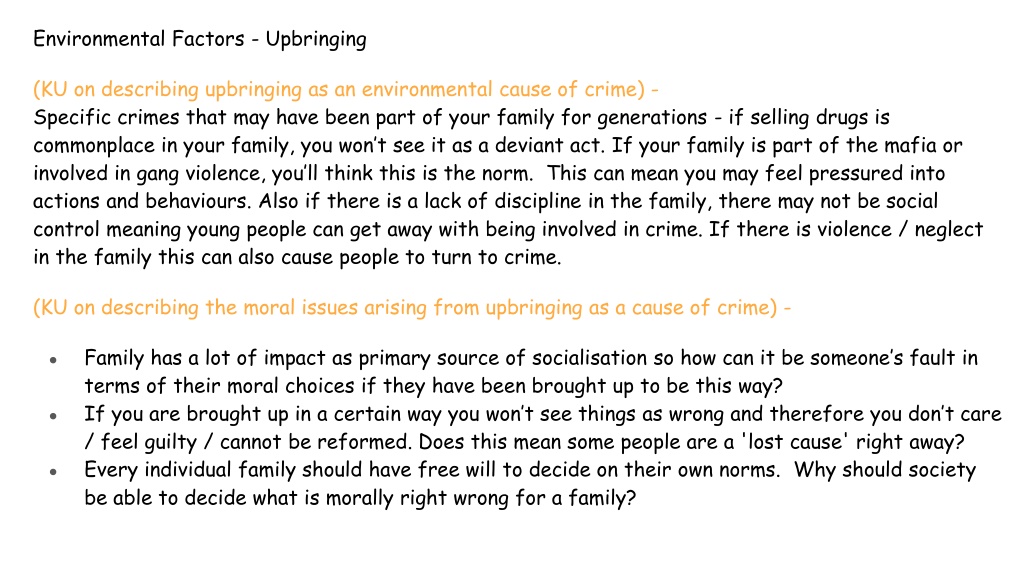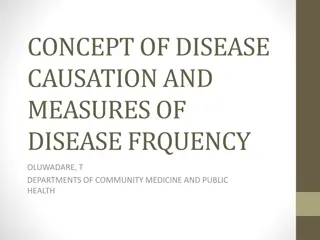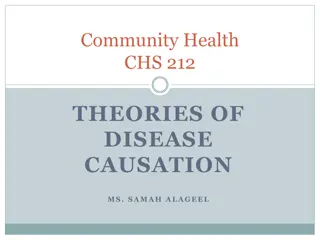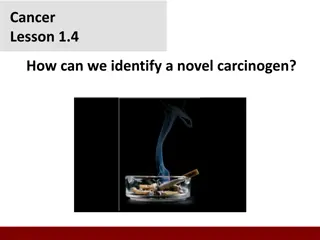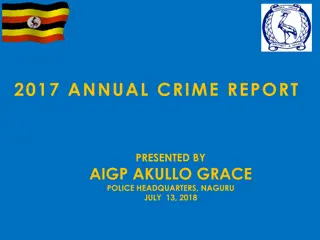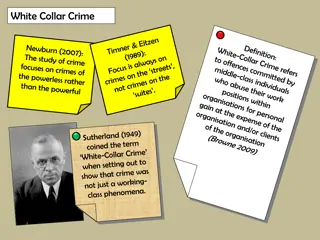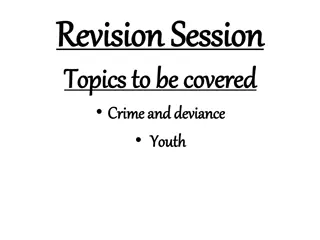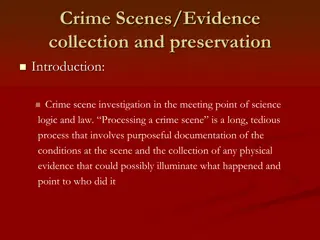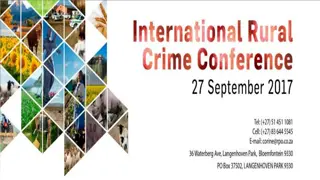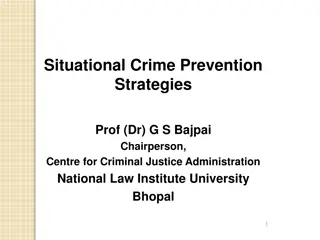Understanding Environmental and Psychological Factors in Crime Causation
Upbringing, poverty, and peer pressure are environmental factors influencing criminal behavior, while abusive relationships, mental health issues, and learning difficulties are psychological factors. These factors shape individuals' moral choices and contribute to criminal activities, raising questions of societal responsibility and individual accountability.
Download Presentation

Please find below an Image/Link to download the presentation.
The content on the website is provided AS IS for your information and personal use only. It may not be sold, licensed, or shared on other websites without obtaining consent from the author. Download presentation by click this link. If you encounter any issues during the download, it is possible that the publisher has removed the file from their server.
E N D
Presentation Transcript
Environmental Factors - Upbringing (KU on describing upbringing as an environmental cause of crime) - Specific crimes that may have been part of your family for generations - if selling drugs is commonplace in your family, you won t see it as a deviant act. If your family is part of the mafia or involved in gang violence, you ll think this is the norm. This can mean you may feel pressured into actions and behaviours. Also if there is a lack of discipline in the family, there may not be social control meaning young people can get away with being involved in crime. If there is violence / neglect in the family this can also cause people to turn to crime. (KU on describing the moral issues arising from upbringing as a cause of crime) - Family has a lot of impact as primary source of socialisation so how can it be someone s fault in terms of their moral choices if they have been brought up to be this way? If you are brought up in a certain way you won t see things as wrong and therefore you don t care / feel guilty / cannot be reformed. Does this mean some people are a 'lost cause' right away? Every individual family should have free will to decide on their own norms. Why should society be able to decide what is morally right wrong for a family?
Environmental Factors - Poverty (KU on describing Poverty as an environmental cause of crime) - Poverty is having few resources compared to the rest of society it means not having the basic things needed to survive. Poverty can be thought of as a cycle and it can be very difficult for people to make their way out of poverty. This often leads to crime for varying reasons e.g with fewer resources you may be more likely to steal or commit crimes that lead to financial gain e.g. low level drug dealing. Desperation due to poverty may also lead to violence and crime. (KU on describing the moral issues arising from Poverty as a cause of crime) - Is it fair to treat different people for the same crime? If coming from an impoverished background do they / can people have the same moral code? Should people from different socioeconomic backgrounds be punished in the same way? Are some crimes out of necessity? To what extent is that state / society ultimately responsible for crime rates linked to poverty? Should the state be doing more to help those in poverty?
Environmental Factors - Peer Pressure (KU on describing Peer Pressure as an environmental cause of crime) - Being defined as people you are surrounded by and can be positive or negative. Your peer group has a secondary socialisation role and includes people you work with or socialise with, classmates etc. Being part of a particular peer group could lead to 'peer pressure' to commit crime like burglary due to going along with the crowd . Gangs and gang violence could also be influenced by peer pressure as well as selling and taking drugs. (KU on describing the moral issues arising from Peer Pressure as a cause of crime) - In some areas, some crimes are easier to get involved in You have free will so should be morally responsible for your actions However, on the other hand, peer pressure can force people to conform with certain behaviours. May be hard to escape peer group due to fear. Should they still be held responsible if they have been coerced into committing the crime? In groups people tend to absolve their moral responsibilities - are they still responsible for their actions?
Psychological factors - Abusive relationships / Mental Health / Learning Difficulties (KU on describing abuse / mental health / learning difficulties as a causes of crime) - Abusive relationships can include things like verbal abuse but also physical and / or mental abuse such as assault / rape / bullying etc. People could be manipulative and in control of another person insofar as they take advantage of them and make decisions for them. People with mental health issues may not fully be aware of the difference between right and wrong due to their clouded state of mind. People with various neurological conditions or learning difficulties may have a lower mental age and may therefore struggle to understand situations fully. (KU on describing the moral issues arising from abuse as a cause of crime) - To what extent can they be held accountable for their actions? To what extent should people be treated differently based on personal life? Should the abuser be prosecuted in the same way if they are also a victim? Are we protecting the vulnerable by prosecuting someone who has been abused? Can some crimes be justified based on previous abuse someone has suffered?
(KU on describing the moral issues arising from mental health as a cause of crime) - Medication may affect behaviour. Should they still be held responsible for their actions if this had an influence on their actions? How would this be proven? May not care about consequences due to depression. Vulnerable so may be easily persuaded to do something illegal or they could be taken advantage of due to their state of mind. May feel like only option e.g. Ruth Ellis. (KU on describing the moral issues arising from learning difficulties as a cause of crime) - They may genuinely not understand the difference between right and wrong and may not be able to process the consequences of what their action will be. They may be vulnerable and be prone to being easily influence by others e.g Derek Bentley. Should they be punished in the same way? What if they have not been diagnosed with any specific condition or learning difficulty? Sometimes people can be diagnosed much later in life or never at all? How would you tell if they genuinely did not realise the severity of their actions or crime?
Derek Bentley Timothy Evans Ruth Ellis
Task Take notes on the causes of crime (environmental and psychological) Take notes on the moral issues arising from the causes (you should have some from the previous task / combine or add what you think is necessary to help build up your KU points for essays, you do not need to copy everything from all the slides!!). Research the 3 cases of the people on the previous slide Write a short summary of the case (I mean short as you will not write details of the case in an essay but you should know the basic details so you can use it as an example) Write out what could have been the causes of crime (if they had commited the crime) in each case explaining WHY these factors may have led the person to committing the crime Write out any moral issues related to the causes or the case in general. Remember a moral issue is a problem / something people argue is unjust / something that would cause controversy, disagreement, debate. If you have or can get a copy of the film, 'Let him have it'. I would recommend watching. It is about the case of Derek Bentley and relates very well to the course for causes of crime, moral issues and Capital Punishment!
